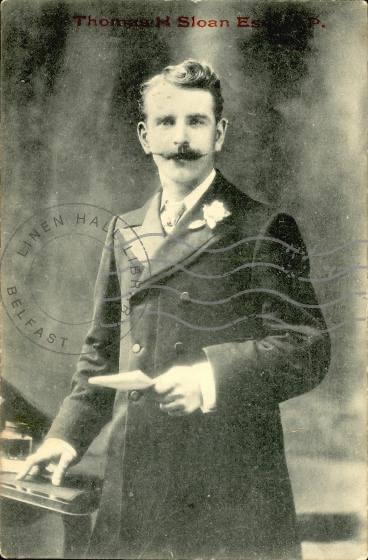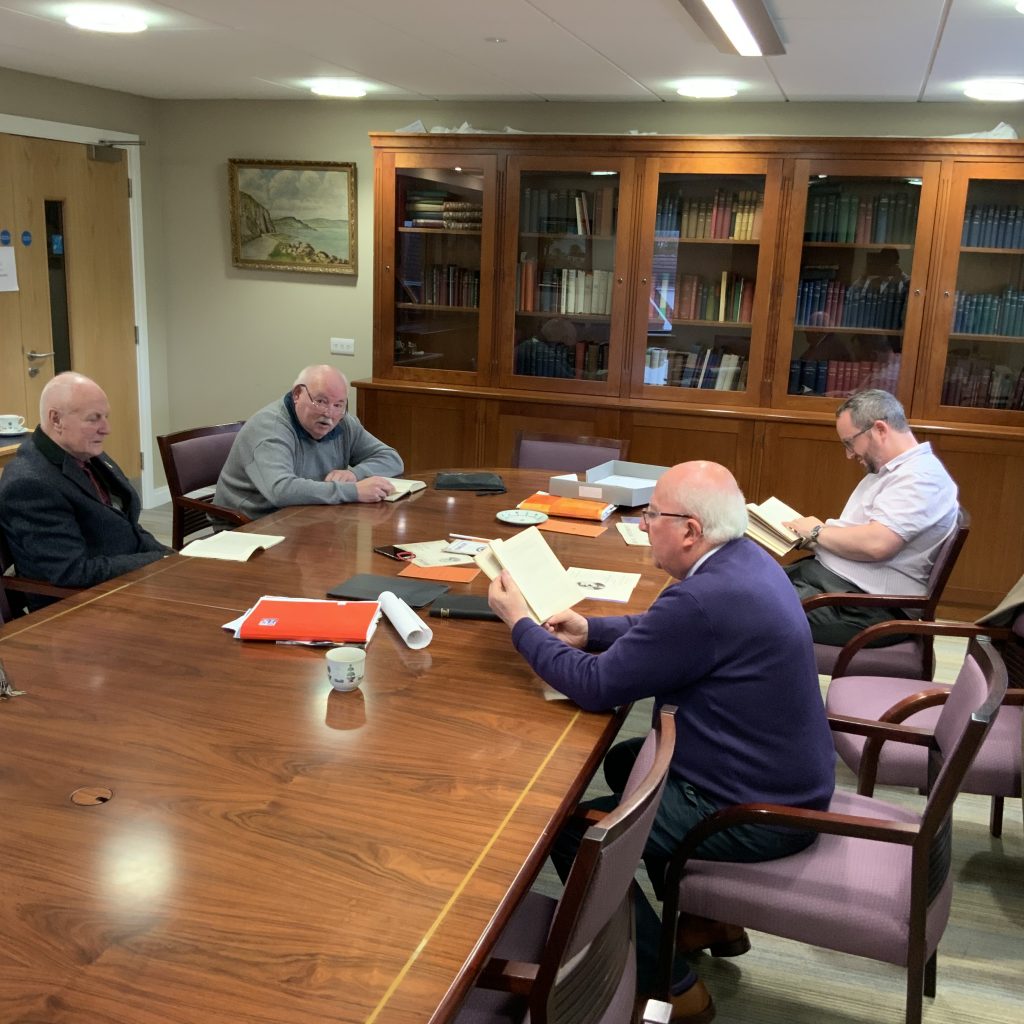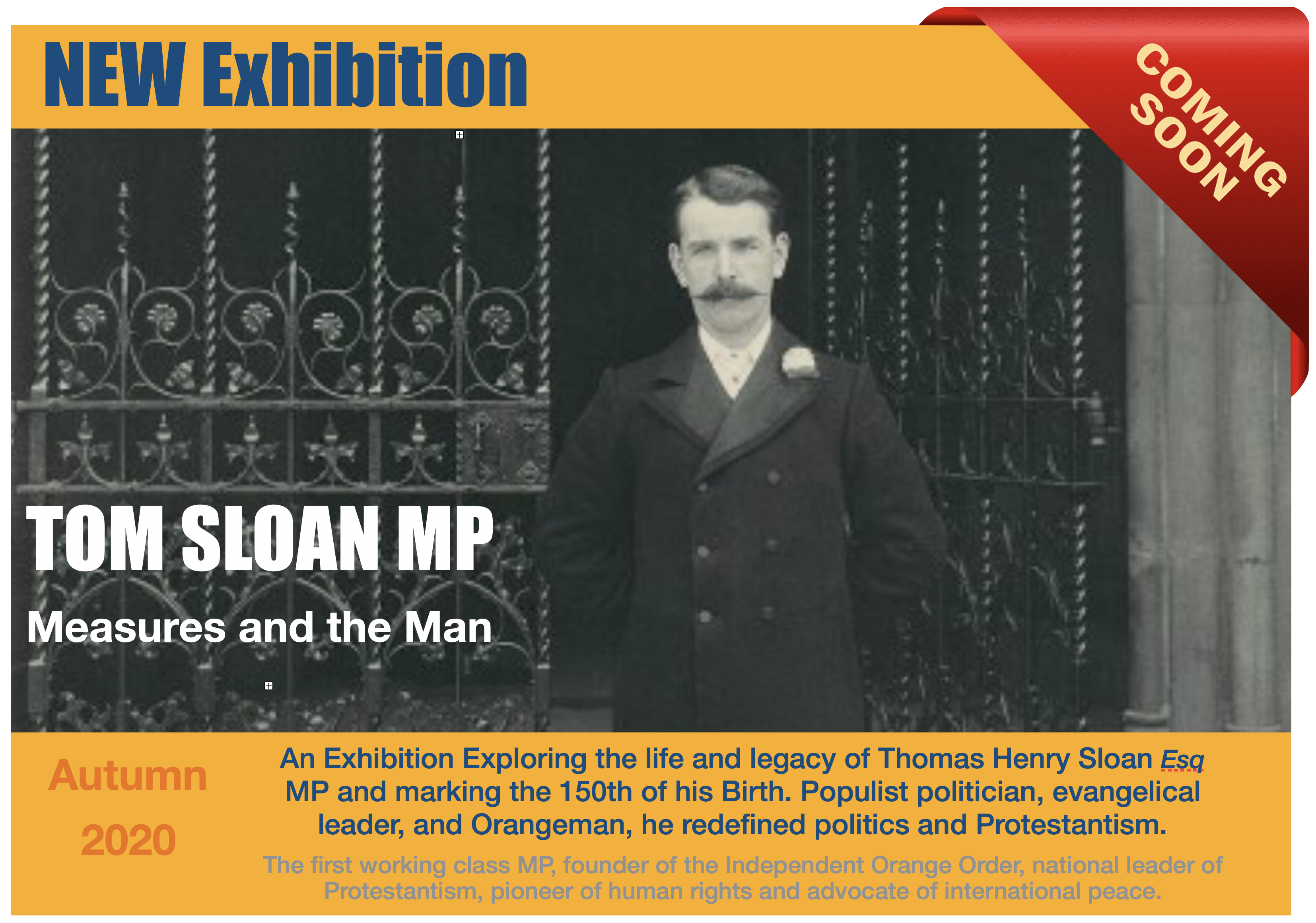One of the exciting programmes running behind the scenes this year has been a research programme into one of the founders of the ILOI Thomas Henry Sloan MP. He best personifies the concept of Independent Orangeism from his passionate evangelical Protestantism, to his working-class roots and championing of democracy and rights for all. He was born in one of the most deprived areas of Belfast, the infamous Sailorstown and despite bright and capable he had to leave school at an early age beginning work in the shipyard. Here he worked as a semi-skilled worker and soon his talents for oratory shone through as he led lunchtime gospel meetings in the shipyards. He was known as the ‘wee man from the yard’ and soon moved to the most challenging of public spaces in the city – the Customs House Steps. Here he competed with socialist rabble-rousers, experienced street preachers and an array of showmen and evangelists. His passion, wit and courage brought him to the attention of the Belfast Protestant Association led by Arthur Trew.

Life and Legacy
This began the public career of one of the first working-class politicians in the world. At a time when Parliament was the preserve of the landed and wealthy or the place of parties and professional politicians Sloan broke that mould. From his maiden speech when his ability to deal with hecklers on the Customs House Steps was used to rebuff his Nationalist critics in one of the most story maiden speeches ever recorded to his organisation of the largest petition ever seen by the Houses of Parliament Sloan tore up the rule book. He championed change and this was most evident in the movement that was closest to his heart – the Orange Order. He was a Protestant first but saw the Orange Order as the embodiment of that, the church in action, and when he saw it inactive, silent and even scared he pushed for change. His vision was of a democratic, populist movement which would become a political force not beholden to any party and would drive forward a national Protestant agenda that would bring a new Reformation, not only in church but state and in society.
Coming from inner-city Belfast he knew what poverty and social deprivation looked like, and he had a vision for change and betterment. From the usual Edwardian remedies like temperance and better living conditions, he went further calling for workers rights, old age pensions and better housing. However, he spent much of his energy exposing and attempting to legislate against the human rights abuses which only in this generation we recognise fully – clerical institutional abuse. As he attempted to improve working conditions in factories he focussed on the workhouses, and laundries run by the Roman Catholic church where those held there were worked like slaves. This crusade and his prolific speaking across the UK led to his rise as a leader of Protestantism, and in that role, one of his most notable acts was to become involved in an International Peace Mission fostered between religious leaders in Germany and Britain who feared that the arms race and Imperial competition between these two once close nations would led to war. Sadly their fears were realised in 1914, but as early as 1908 Sloan was part of an international movement who saw the shared faith of the two countries as a means of averting the descent to War.
By 1910 ‘big-house’ unionism and ‘old order’ Orangeism had regrouped and were on the offensive. After a bitter election, Sloan lost his seat, the ILOI had been deprived of dozens of its Orange Halls and as the Unionist community united to face the threat of Home Rule, Sloan and the Independents were literally the focus of attack. While ill his house was attacked by a mob, the ILOI Headquarters in Great Victoria Street was bombed and in North Antrim parades and meetings attacked with the loss of life. Boycott and unemployment were the weapons used and even Sloan was forced to seek employment in the United States for a period. Upon his return he was vocal in the 1930s as he saw the Unionist Government at Stormont failing its own people during the Depression, however, he was equally strident in his attack on Socialist and Communist elements.
Sloan was a complex character, some say a reluctant rebel who wanted to see a united and a proactive Unionism advancing the cause of Protestantism. Despite the influence of Lindsay Crawford and Rev D. D. Boyle the ILOI is very much Sloan’s movement. He guided it through difficult times and dealt with the very big personalities of the other founders. The potential of the fledgeling movement to fracture, to spiral off as some did down other avenues was great and the fact it survived those first difficult decades is very much down to Sloan.
Celebrating Sloan
The research phase of the project has been hampered by the pandemic, with access to the Public Records restricted. We have also discovered a wealth of new material relating to Sloan and while this is the 150th anniversary of his birth, we will take the time necessary to do the man and his legacy justice. The project to date has involved a heritage aspect funded by Belfast City Council under the auspices of the Reconnect Project. This set Sloan and the Order in Belfast in context and gathered vital foundational information. We have worked with the Museum of Orange Heritage at Schomberg House and wish to thank the Grand Lodge of Ireland for opening their archives and records to us.
 At present one of our members, Bro Gregory Campbell MP is working with the Library and Archives of the Houses of Parliament to shed light on the extensive and active Parliamentary career of Sloan. We are also reaching out to a number of Protestant and Church groups he played an active part in and finally, we are working with the National Portrait Gallery which holds important portraits of Sloan in their collection into the men and women who shaped our nation. While the National Portrait Gallery is closed for refurbishment we hope they will allow these important items to be loaned back to Parliament and that in 2021 they will form the centrepiece of an exhibition into the life and work of Sloan in the Houses of Parliament.
At present one of our members, Bro Gregory Campbell MP is working with the Library and Archives of the Houses of Parliament to shed light on the extensive and active Parliamentary career of Sloan. We are also reaching out to a number of Protestant and Church groups he played an active part in and finally, we are working with the National Portrait Gallery which holds important portraits of Sloan in their collection into the men and women who shaped our nation. While the National Portrait Gallery is closed for refurbishment we hope they will allow these important items to be loaned back to Parliament and that in 2021 they will form the centrepiece of an exhibition into the life and work of Sloan in the Houses of Parliament.
 We believe his home city and the constituency he represented will play an active part in our commemorations which will be held back until next year when hopefully COVID restrictions will be such that they can be held properly. Until then and in this the year of his birth our online museum will in the Autumn host an exhibition on Sloan and produce a travelling exhibition where lodges and others can learn more about this important national figure.
We believe his home city and the constituency he represented will play an active part in our commemorations which will be held back until next year when hopefully COVID restrictions will be such that they can be held properly. Until then and in this the year of his birth our online museum will in the Autumn host an exhibition on Sloan and produce a travelling exhibition where lodges and others can learn more about this important national figure.
